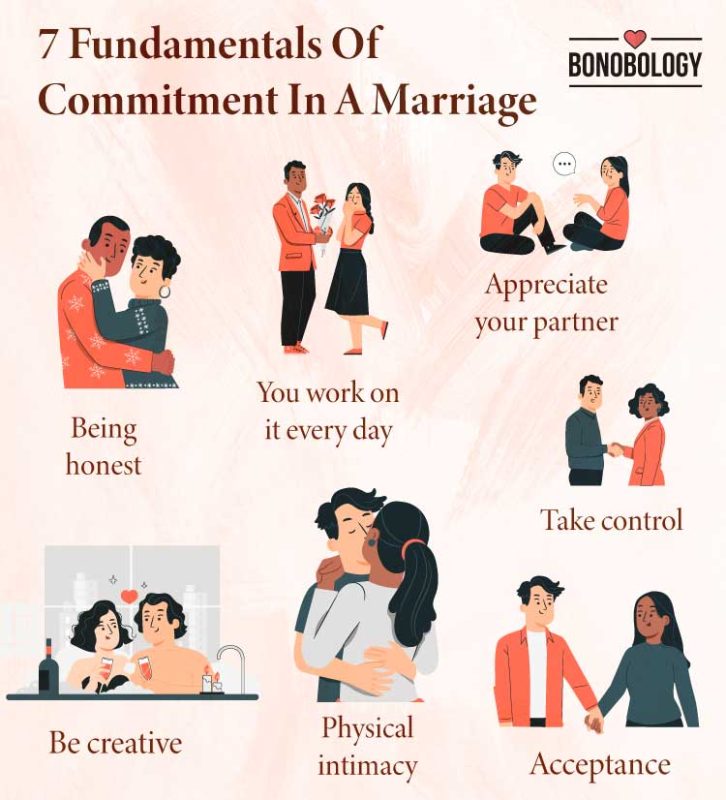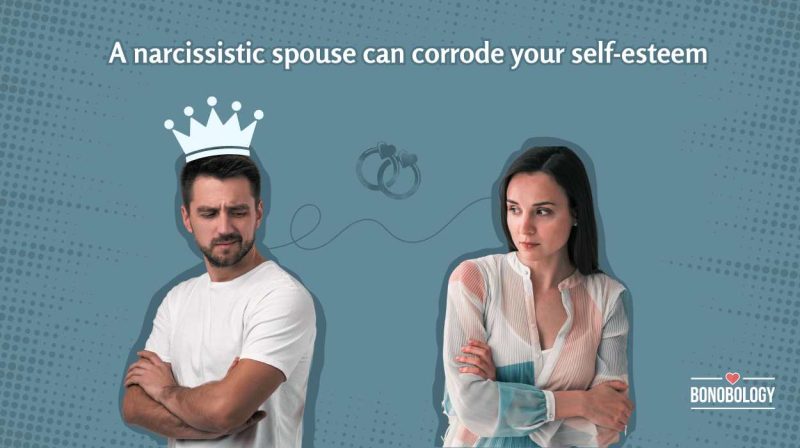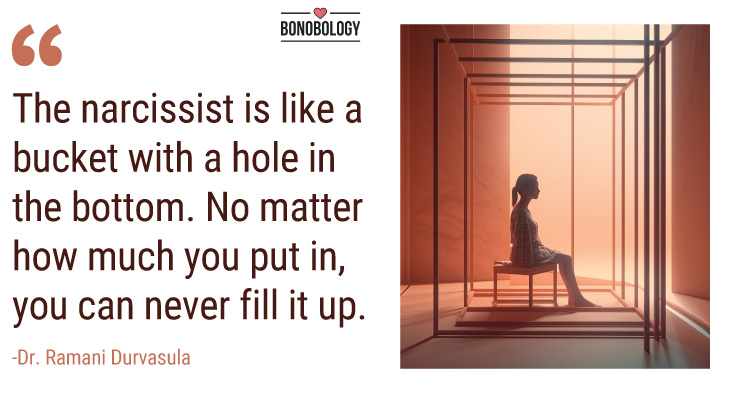Commitment in marriage is like eating the same food for years until you die. After all, marriage is a lifetime commitment. How does one not get bored of it? How does one not crave other options? “It’s difficult but worth it” is the answer you hear from people who have honored marital commitment for years, building successful, happy, and strong marriages.
A study on how marriage can change you and your partner in really big ways found that some transformations that can enhance the committed relationship include mutual respect, trust, and commitment, along with communication patterns, and intimacy. This means building marriage commitment is one of the most important things for strengthening a bond and maintaining a long-lasting and fulfilling relationship. But what do all of these terms mean? What does “commitment” mean?
Let’s dive deeper into these questions with the help of emotional wellness and mindfulness coach Pooja Priyamvada (certified in Psychological and Mental Health First Aid from Johns Hopkins Bloomberg School of Public Health and the University of Sydney). She specializes in counseling for extramarital affairs, breakups, separation, grief, and loss, to name a few.
What Does Commitment In A Marriage Mean?
Table of Contents
Pooja says, “Commitment in marriage can mean different things to different individuals and couples. But it can be a set of non-negotiable basic rules or promises for both partners. This would mean that both partners have consented to these and are ready to remain committed to these rules for as long as they are together.”
- Who’s going to feed the baby at 3 a.m.?
- Is flirting with other people allowed?
- Who’s going to pick the children up from football practice?
- Is an extramarital affair forgivable?
- Is staying friends with an ex on Facebook okay? Do porn, massages with happy endings, or online affairs qualify as infidelity?
- What would quality time look like for both of you?
Marital commitment is mutually searching for answers to such difficult questions and finding marital happiness with the aim to stay together.
According to Dr. Michael Johnson, a sociology professor at Penn State University, there are three types of love and commitment in a marriage— personal, moral, and structural.
- Personal commitment means “I want to stay in this marriage.”
- Moral commitment is “I made a promise to God; marriage is a sacred commitment; it would be immoral to give up on this marriage.”
- Structural commitment in marriage is: “My kids will suffer”, “Divorce is too costly”, or “What will society say?”
Having a clear understanding of your “why” is crucial for building a strong marriage commitment, and there are many ways to achieve this. If you have the answer to this “why” in place, commitment and the emotional bond can be easier for you. So, when things go wrong (as they inevitably will in any long and complex marriage), you can go back and look at the answer to “why” you got into this marriage in the first place.
Personal commitment is the most important type of marital commitment. In a marriage, love, and commitment must come from within, not from external factors. If you are staying with your partner just for the sake of kids, for financial reasons, or because you’re too scared of what others will say, you may easily find yourself feeling frustrated, thinking commitment has been “imposed” on you. So, how do you cultivate personal commitment in marriage with a strong foundation so that it doesn’t feel like a burden to you? And what exactly does commitment mean in a marriage? Let’s find out.
The 7 Fundamentals Of Commitment In A Marriage
On the importance of marital commitment to keep a marriage intact, Pooja says, “Commitment is not essential for just marriage but for any relationship. More so for marriage, because it brings with it a new set of relationships with the spouse’s family and might also include having children together or parenting offspring from previous marriages.”
But how and why does one stay married and emotionally committed for years? After all, it can get frustrating and monotonous! How do you not give up on someone? To find out the answer to such questions, let’s dive deep into the fundamentals of commitment in marriage:

1. You have to work on it every day
Commitment issues in marriage arise because, at some point, spouses stop working on their connection. A spouse’s commitment falls short. Just as Rome wasn’t built in a day, commitment in marriage requires constant work. Every little conversation counts, and every little habit matters. All these little things accumulate over the years, serving as the foundation of unwavering commitment between partners. It’s one of the most important things to which you pay attention every single day to foster marital happiness.
Pooja explains, “Marital commitment requires constant work on oneself and the committed relationship. It is like nurturing something together. In life, there are always “options”, and there is no harm in taking them, provided one is clear about their primary relationship with their partner. The notions of fidelity, how much flirting is okay, does a threesome amount to infidelity — such tough questions need to be asked and introspected.”
2. Be creative in your marriage
Commitment and faithfulness in a marriage become easy when there is a sense of novelty. So, instead of looking for new partners (which is why many marriages fail), start looking for new activities that you can enjoy as a married couple and spend some quality time together. Find different adventures to keep the spark going and the commitment alive; this will strengthen the personal commitment in your marriage. Some of them can include, but are not limited to:
- River rafting,
- Wine tasting,
- Playing tennis,
- Salsa/Bachata classes,
- Making couple friends
Being creative also means talking about different aspects of marriage, including infidelity. Pooja suggests, “Rediscovering new common interests, having a fulfilling life outside of
marriage and kids, and maintaining your own personality, interests, and social group away from the partner are some of the ways to keep the relationship fresh and alive. Infidelity does seem tempting, more so when it is casual and might not have impending consequences for the primary relationship. In such situations, people need to re-examine what their vows are and how they renegotiate boundaries with their partners.”
Related Reading: 10 Tips For A Happy Married Life — Confessions Of A 90-Year-Old
3. Appreciate your partner
There has been much research to find the relationship between appreciation, gratitude, marital commitment, and satisfaction. One piece of research shows that if you appreciate and express gratitude toward your partner, you are more likely to have a satisfying relationship. Interestingly, the study also found that gratitude can benefit your overall emotional and physical health and improve your social relationships, including marriage.
Marriage is way more than floor-sliding love, it’s a choice to sustain that emotional bond. And when you make this choice to stay together, you have to remember that it takes effort to show commitment in marriage. So, support your partner’s growth and focus on their good parts. The best marriages are those that enable both partners to evolve into the best versions of themselves.
4. Take control of your mind
It could be flirty glances across the room with a stranger or responding to the text of a cute person hitting on you — if you are someone who constantly “slips away” while you are committed, start taking control of your mind to keep your marriage intact. Self-control is a skill that comes with practice. Marital commitment requires constant authenticity, sacrifice, and honesty, which may come from within your soul. A few ways to bring that out can be by,
- Deep breathing, meditation, and praying for marriage restoration
- Finding healthy distractions like dancing, writing, or sports
- Keeping an eye out for your impulsive thoughts
- Becoming aware of your impulses and working to resist acting on them
In fact, a study was also done to examine the role of self-control in marital commitment and satisfaction. They found that changes in self-control levels can affect day-to-day relationship satisfaction, implying that cultivating and sustaining self-control is crucial for establishing a joyful and satisfying marriage.
Related Reading: 6 Facts That Sum Up The Purpose Of Marriage
5. Accept your spouse for who they are
What does commitment mean in a marriage? Whether you believe that marriage is a sacred commitment or not, a large part of it consists of accepting your partner’s true nature. It’s not going to be a perfect marriage; there are no perfect marriages, and no concept of a perfect emotional bond exists either. Don’t constantly compare your marriage to that of others or to an idealistic standard you might have set in your mind.
Don’t see things as either black or white; try gray. An American study has called this the “suffocation model” — either the marriage is breathing just fine, or it feels like it’s choking you! This study talks about how marriage is becoming more of a “go big or go home” concept in America. People are either super committed to making it work, or they just want out. This is hurting them emotionally. To prevent that from happening, you need to accept each other in totality, warts and all, and also make peace with the fact that your relationship will be imperfectly perfect – just like the people in it.
If you’re struggling to come to terms with these notions, it can be helpful to seek couples’ therapy for a stronger sense of commitment in a marriage. Marriage is a dynamic bond. There will be times when you will drift apart and then come back together stronger. That’s how it functions.

6. Be honest and establish trust
Trust, honesty, and loyalty in a relationship take years to build. A spouse’s commitment in a marriage must be to provide the other with a safe and non-judgmental space to be vulnerable and cultivate an emotional bond. One way to strengthen marriage commitment is to engage in regular, open communication with your partner about your feelings and needs, and find ways to support each other’s growth and goals.
A study done to understand the relationship between marital satisfaction and good communication found that how well you and your partner talk to each other is one of the most important things for a happy marriage. Basically, good communication equals good relationship vibes. Pooja also explains, “If both partners are sure about the commitment from each other, they would feel more secure about the relationship.”
7. Physical intimacy
Renowned psychotherapist Esther Perel explains, “One can live without sex but one cannot live without touch. Children who were not touched warmly during childhood develop attachment disorders when they grow up. If you don’t touch your partner, except for sex, they might become irritable. Humor, touch, playfulness, cuddling, skin-to-skin contact, eye contact, and an ongoing curiosity about who your partner is as a person—these are the secrets behind commitment in a marriage.”
This makes perfect sense given that marriage is a lifetime commitment, and it, therefore, becomes even more vital to keep the relationship and commitment alive. Some ways this can be done include:
- Holding hands more frequently
- Scheduling time to spend with your partner
- Experimenting with being more emotionally vulnerable in intimate situations
- Cuddling and hugging each other often
Related Reading: Lack Of Affection And Intimacy In A Relationship — 9 Ways It Affects You
Key Pointers
- Marital commitment means basic rules or promises that are non-negotiable for both partners
- Some of the fundamentals of commitment include working on the marriage every day, physical touch, being honest, expressing gratitude, and getting creative in your marriage
- Seek professional help if you find yourself struggling to create an emotional bond and commitment in your marriage
Pooja points out, “One must understand that, ultimately, marriage is about the two of you. Hence, having heart-to-heart communication about expectation management and what the general dos and don’ts need to be established and changed from time to time.” Hence, commitment in marriage is not an easy task. But if you work on harnessing it, one day at a time, it is not too difficult either. Don’t place your partner under a microscope and constantly express love, gratitude, and honesty toward them. Respect each other and give each other space to grow. If you find yourself struggling at any point, don’t shy away from seeking professional help. The counselors on Bonobology’s panel can help you with this.
This post was updated in May 2023
FAQs
Commitment is so important in all relationships, but marriage in particular, because if the commitment takes a hit, it’s not just two people’s lives that get affected. The lives of the children are also involved, and going through this might impact them with abandonment and commitment issues. Your patterns of commitment would influence their patterns as well.
If you stay committed, you can have a happy and fulfilling marriage. Staying in a marriage with a weak sense of commitment will affect your mental health because you’re neither totally in it nor fully out of it. This middle ground will confuse you and affect your happiness and that of your whole family.
Have a really strong intrinsic reason for “why” you are in this marriage. Be honest with your partner. Express respect and gratitude for all the good things they do. Communicate everything that you want for them. Apologize often and practice forgiveness. Try new things with them. Marital commitment is built on these aspects.
Marriage Counseling – 15 Goals That Should Be Addressed Says Therapist
Your contribution does not constitute a charitable donation. It will allow Bonobology to continue bringing you new and up-to-date information in our pursuit of helping anyone in the world to learn how to do anything.























Featured
50 Questions For Premarital Counseling To Prep For Marriage
Why Is Marriage So Hard? Reasons And Ways To Make It Worthwhile
15 Signs Of Being Married To A Narcissist And How to Cope
Building Healthy Boundaries: The Key to Trust and Respect in Relationships
How To Deal With A Negative Spouse – 15 Expert-Backed Tips
What Is A Codependent Marriage? Signs, Causes, And Ways To Fix
7 Signs You Have A Verbally Abusive Wife And 6 Things You Can Do About It
Emotional Dumping Vs. Venting: Differences, Signs, And Examples
Husband Wife Relationship – 9 Expert Tips To Improve it
12 Hurtful Things You Or Your Partner Should Never Say To Each Other
7 Expert Tips To Resolve Conflict In A Marriage
Rediscover The Spark: How To Fall Back In Love With Your Partner
3 Key Skills To Save Your Marriage & Stop Divorce
Roommate Marriage – Signs And How To Fix It
What To Do When Your Husband Belittles You
How To Deal With A Lying Husband?
Why Am I So Depressed And Lonely In My Marriage?
11 Signs You Have A Narcissistic Wife
21 Signs Of A Narcissistic Husband And How To Cope
17 Positive Signs During Separation That Indicate Reconciliation